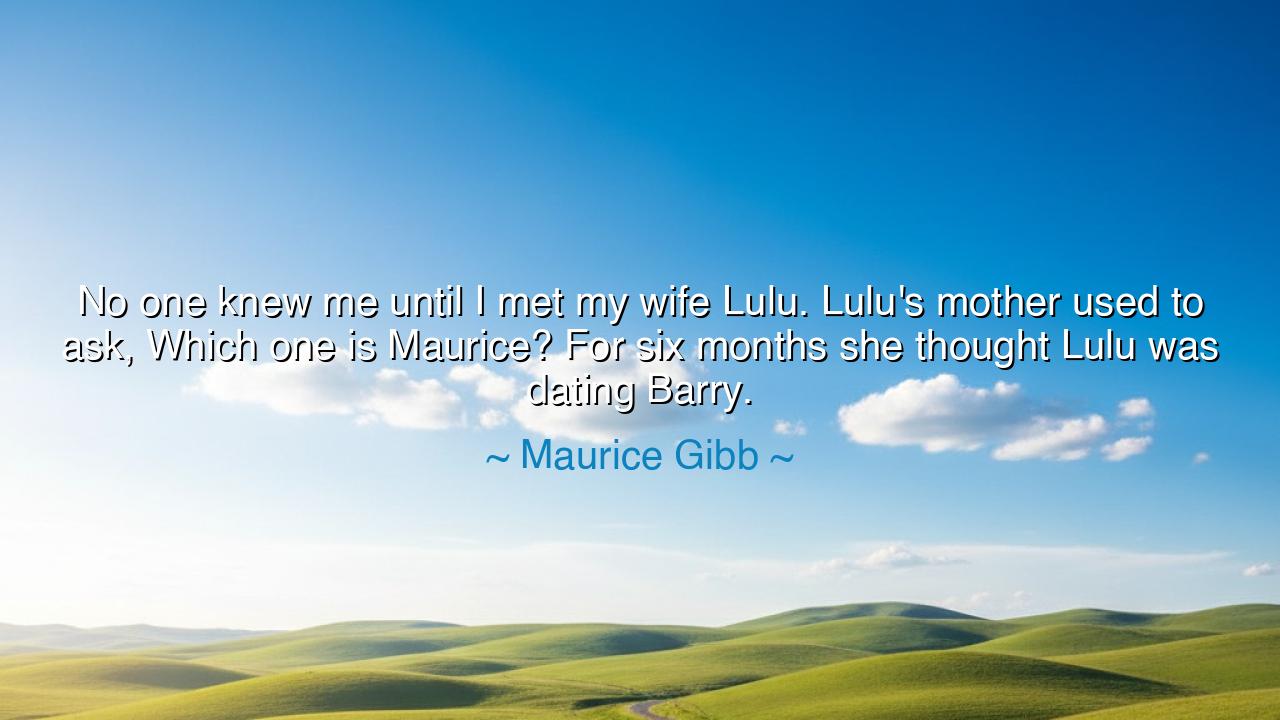
No one knew me until I met my wife Lulu. Lulu's mother used to
No one knew me until I met my wife Lulu. Lulu's mother used to ask, Which one is Maurice? For six months she thought Lulu was dating Barry.






The words of Maurice Gibb—“No one knew me until I met my wife Lulu. Lulu’s mother used to ask, Which one is Maurice? For six months she thought Lulu was dating Barry”—carry within them a truth at once humorous and deeply human. Though spoken with laughter, these words reflect the ancient struggle between individual identity and the shadow of greatness, between the yearning to be seen for oneself and the pull of comparison. In Maurice’s reflection, we hear not complaint, but humility—the quiet acceptance of one who knows that true recognition is not found in fame or applause, but in love that sees the soul beneath the surface.
For Maurice was one of the Bee Gees, brothers bound not only by blood but by the brilliant, blinding light of shared success. Their harmonies filled the world, their music moved generations—but such unity came at a cost. When the world sees a group as one voice, the individual disappears behind the chorus. Maurice’s words, then, reveal the ache of invisibility—the irony that one can be celebrated by millions and yet unknown by those nearest to them. When Lulu’s mother confused him for his brother Barry, it was more than a simple mistake; it was a symbol of how fame can blur the lines of selfhood, turning a man into part of a legend rather than a person.
And yet, beneath the humor of his recollection lies something luminous. “No one knew me until I met my wife Lulu,” he says—not as a complaint, but as gratitude. For it is through love that we are truly known, and through relationship that we are truly seen. The ancients called this the meeting of souls, the sacred recognition that sees not the mask of reputation, but the essence of being. In Lulu, Maurice found that rare mirror that reflects not what the world expects, but what the heart truly is. Love, he suggests, is the great equalizer—it cuts through illusion, hierarchy, and confusion, and whispers to the unseen soul: I know you.
This truth is as old as time. Consider the story of Marcus Agrippa, the loyal friend and general of the Roman emperor Augustus. Though Agrippa’s victories secured the empire, the glory always fell upon Augustus. The poets of the age sang of the emperor’s wisdom and peace, rarely naming the man whose strategy and courage made those triumphs possible. Yet Agrippa never sought the world’s applause; he found joy instead in friendship, in loyalty, in the quiet assurance that his worth was known to those who mattered most. Maurice’s tale carries that same spirit—the nobility of humility, the quiet grace of one who does not demand recognition, but cherishes genuine understanding where it is given.
There is also in his words a lesson on the nature of identity within unity. Just as Maurice was one of three brothers, so too in life we all belong to larger wholes—families, communities, partnerships. It is easy to lose ourselves within these collectives, to be mistaken for another, to be defined by our role rather than our essence. But love, in its highest form, restores individuality within connection. It says, “You are part of something greater, but you are also uniquely you.” Maurice found that balance not on stage beneath the lights, but in the quiet constancy of his relationship. It was in the intimacy of being known by another that he rediscovered his own reflection.
His story also reminds us of the humility of laughter. When he recalls that Lulu’s mother mistook him for Barry for half a year, he does not speak with bitterness but amusement. This is the wisdom of perspective—the understanding that ego and resentment are burdens to the spirit. To laugh at being unseen is to transcend the need for validation. In laughter, Maurice reveals that the truly secure soul has no need to prove itself; it delights in the absurdities of life, knowing that love and peace matter more than recognition.
So what lesson do we draw from this? It is this: to be known is not the same as to be famous. The world may know your name, but only love knows your heart. Seek not the kind of recognition that fades when the applause ends, but the kind that endures in the eyes of those who truly see you. Cherish the bonds that reflect your true self, and nurture the humility that allows you to laugh when life confuses your place in the world.
For in the end, the story of Maurice Gibb is not about mistaken identity—it is about found identity. The man who was once hidden in his brother’s shadow discovered himself through the light of love. Let that be your guide, too: to seek not to be known by all, but to be deeply known by a few; not to be remembered for the noise you make, but for the warmth you leave behind. For fame fades like a song’s last note—but being truly known, even by one heart, endures forever.






AAdministratorAdministrator
Welcome, honored guests. Please leave a comment, we will respond soon